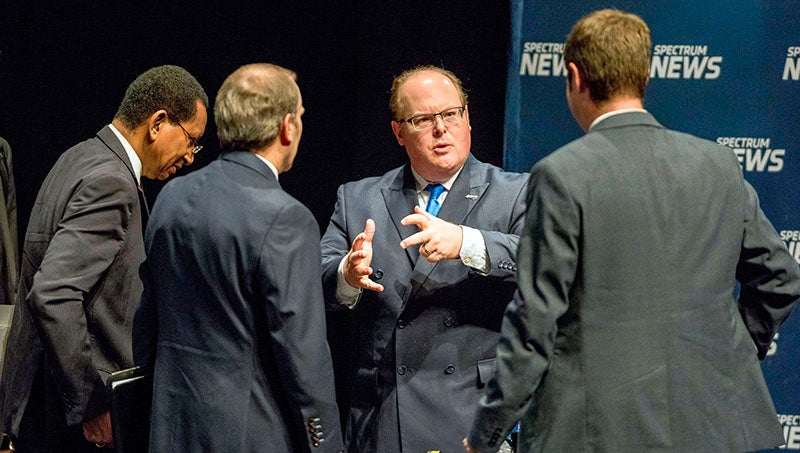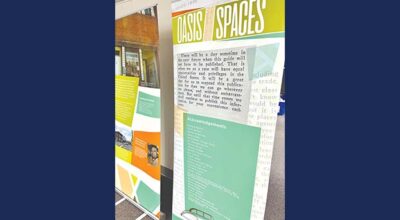Turnage to host televised debate on Voter ID
Published 2:24 am Saturday, September 29, 2018

- ROUND TABLE: (Left to right) Sen. Floyd McKissick, Sen. Paul Newton, North Carolina Democratic Party Chair Wayne Goodwin and Brent Woodcox, special counsel to the North Carolina General Assembly, discuss judicial amendments in the first of four debates hosted by the North Carolina Institute of Political Leadership. (Jon Lakey/Salisbury Post)
Two Republicans will square off against two Democrats on Tuesday night to talk voter ID.
Donald Bryson, president and CEO of the Civitas Institute, Kareem Crayton, executive director of Southern Coalition for Social Justice, District 36 Representative Greg Murphy and District 3 Senator Erica Smith will share their views on the proposed Constitutional amendment that would require voters to present photo ID before voting.
The Hometown Debate is hosted by the NC Institute of Political Leadership, a non-partisan, nonprofit organization, and will be recorded and broadcast by Spectrum. Spectrum’s senior political reporter Loretta Boniti will moderate, according to a NCIOPL press release.
The voter ID debate is one of four, each about one of six amendments that voters will be deciding in November. The first, held Sept. 25 in Salisbury, discussed an amendment about how judicial vacancies are filled; the third, to be held Oct. 9 in Clayton, will take on the amendment limiting the governor’s power to make appointments to the State Board of Ethics and Elections Enforcement; the last will be held Oct. 16 in Gastonia — this one a debate about an amendment lowering the income tax rate from a maximum of 10 percent to 7 percent.
“The goal of these events is to encourage and enhance education dialogue at a local level — equipping voters with information they can use to make more informed business, policy, and electoral decisions,” NCIOPL Board Chair Nelle Hotchkiss wrote in the release.
Both local party chairs said they plan to be there.
“The Democratic Party will be very pleased to see this event happen. We are very much against all of the six amendments that are proposed,” said Beaufort County Democratic Party Chair Elaine Wood. “Voter ID is still an important issue. We feel strongly that it would reduce voting — there’s a lot of people who don’t have driver’s licenses, and don’t have the ability to get a license. This is a very important issue to us. We have always stood firm on that; we don’t think it’s necessary.”
Beaufort County Republican Party Chair Patricia Garrison said the Voter ID amendment is no different from those already in effect in 34 other states.
“The intent of voter ID is not to limit American citizens from voting. To me, voting is a sacred right that is granted to American citizens, and we should all protect that,” Garrison said. “We have the right and responsibility to elect our leaders. … My view and the view of many voters across the board is it’s not a political party issue — it’s the issue of a U.S. citizen being granted the sacred right to vote.”
Kellie Harris Hopkins, executive director of Beaufort County Board of Elections, has reservations about the proposed Voter ID amendment for different reasons.
“My thing about the voter ID is it’s just so broad. It doesn’t give specifics in how that will be implemented and how it will be used. It’s just very broad,” Hopkins said.
Tuesday’s debate is free to the public. The doors will open at 6:30 p.m. and the debate will start at 7 p.m. It will be aired in its entirety on the Spectrum website, www.spectrumlocalnews.com, and again, in short form, on Spectrum’s “In Focus” on Oct. 7 at 11:30 a.m. and 8:30 p.m.
The Turnage Theatre is located at 150 W. Main St., Washington.
Previous coverage from the Salisbury Post
By Andie Foley
The Salisbury Post
The North Carolina Institute of Political Leadership on Tuesday hosted its first Hometown Debate, a series of four forums focusing on six proposed state constitutional amendments that will appear on the Nov. 6 ballot.
The session, held at the Meroney Theatre in Salisbury and co-hosted by the Rowan Chamber of Commerce, focused on an amendment that would change the way judicial vacancies are filled.
The governor currently fills vacancies choosing from recommendations by local bar associations. The amendment would form a nominating commission with members of the general public that would report to the General Assembly. The legislature would select at least two final candidates, and the governor would appoint one of them.
Discussing the pros and cons of the proposed amendment were state Sens. Paul Newton, R-36, and Floyd McKissick, D-20; North Carolina Democratic Party Chairman Wayne Goodwin; and Brent Woodcox, special counsel to the Republican-controlled General Assembly.
The discussions were moderated by Loretta Boniti, host of “In Focus” on Spectrum News.
Highlights from each speaker are as follows:
Sen. Paul Newton
Speaking in defense of the proposed amendment, Newton said it would end a “good ol’ boy club” in the judiciary, giving women and minorities a greater chance to be nominated to fill vacancies.
He said members of the public would serve on the nominating commission, thereby making it a transparent process.
“It would give an opportunity for a much more diverse set of people to apply, to nominate themselves or to nominate others,” Newton said. “Nominations are much more broad when broadly received and broadly made.”
Newton said the amendment is intended to move the process of filling judicial vacancies away from meeting minimum requirements to a merit-based system.
The nominating commission would inform the Legislature of each possible nominee’s merits, he said, helping guide legislators to make a more informed decision.
“Sunlight is an incredible method to keep people accountable,” said Newton.
Sen. Floyd McKissick
McKissick said the amendment raises the potential for partisanship in the appointment process, calling the proposal an attempt by the Republican legislature to “perpetuate their power.”
“When you think about this amendment in a broader context, it’s been implemented in a way that will allow the Republican majority to get people in office they think will best serve their interests,” McKissick said.
He said North Carolina governors already have limited power and is in the bottom five states for gubernatorial power.
“If this would pass, we would become one of the weakest in America,” he said.
He said the current system works just fine to ensure diversity of candidates and the change is “absolutely unneeded and unnecessary.”
McKissick also faulted the amendment for its lack of detail about the specific authorities of the Legislature and governor in the appointment process.
“It lacks basic details which are fundamental or essential to fairness,” he said.
Brent Woodcox
Woodcox also spoke in favor of the amendment, saying the current system is flawed.
“It gives all of that authority, all of that power to one person,” he said. “Governors of both parties have abused it.”
An example of this, he said, is when former Democratic Gov. Bev Perdue appointed three of her staff members to judicial seats on her last day in office.
“That’s not appropriate,” said Woodcox. “That’s not how we want good government to work.”
He said the new method would institute a system of checks and balances, rejecting the idea that it is a partisan play for power.
The legislature will not always have a Republican supermajority, he said.
“Getting more people involved in the process isn’t a power grab, unless it’s a power grab for the people,” he said.
Wayne Goodwin
Goodwin called the proposed amendment “pure politics,” wondering why the change was not suggested during former Republican Gov. Pat McCrory’s term of office.
He expressed concern that voters will not be aware of what they are voting for, saying the language of the amendment is “more complicated than an insurance policy.”
Goodwin is a former state insurance commissioner.
Goodwin also expressed concern about a provision to allow the chief justice to fill vacancies should the legislature not be in session. Judges are elected less frequently than the governor and members of the legislature.
“You cannot hold the chief justice accountable at the ballot box as quickly as one might need to,” he said.
Like McKissick, Goodwin faulted the amendment for its lack of detail, citing its call for “qualified nominees” with no description of what those qualifications would be.
“I wish that we had the enabling language that would spell that out,” he said. “This proposal doesn’t put the meat on the bones for the merit selection process.”
Watch the debate
Spectrum News will broadcast the debate on its website, www.spectrumlocalnews.com, with an abbreviated version on its program “In Focus” at 11:30 a.m. and 8:30 p.m. Sunday.
Andie Foley is a reporter for The Salisbury Post.





